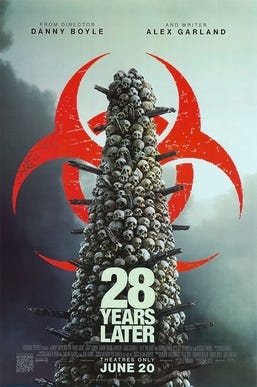22 years ago, 28 Days Later crystalized a kind of cultural revolution in zombie films. Old school zombie movies tended to focus on supernatural, voodoo explanations, with slow moving, moaning zombies that overwhelmed via surprise or sheer numbers1. Sure, there were the goofy zombies of Return of the Living Dead but 28 Days Later set the stage for the tropes of zombies-as-infection, fast zombies and “mankind is the real monster” motifs that became increasingly common since. To be fair, 28 Days Later didn’t exactly create any of these tropes, but brought them together in a perfect soup. Subsequent films like the 2004 Dawn of the Dead remake or World War Z, television shows like The Walking Dead and even video games such as The Last of Us reflect the new cultural zeitgeist of modern zombie films.
The sequel, 28 Weeks Later was to the original as Aliens was to Alien: a fun, action-packed, gore-filled romp. Released in 2007, and appearing to promise a sequel (hey, we still had months and years to get through), we’d need to wait 18 years to actually get it. 28 Days Later was an expose on the evils of mankind, 28 Weeks Later on how well-intentioned plans fall apart. Now 28 Years Later takes the series in a completely unexpected direction. The whole original setup for a sequel to 28 Weeks Later (zombies spread from the UK to the European continent) is waved aside (we’re told the spread to the European continent was beaten back in the opening text scenes) and, instead, we’re given the most soulful and hopeful entry in the series.
The film follows the character of Spike, a 12-year-old boy living on an isolated island community in Scotland, 28 years after the initial virus outbreak. Contrary to all the weird, violent Walking Dead communities, his town is fairly nice, a good community, though lacking in modern medicine or technology. Only a causeway connects the town to the mainland UK and this is only accessible at low tide. All of the UK and Ireland are under quarantine, nobody allowed in or out2. With his father he takes a ritual trip to the mainland to get his first zombie kills.
I admit the movie is good about not taking the directions you might assume. I’ll spare you the details of what happens on this first trip, aside from Spike spots a fire, and learns this may be an old physician, Dr. Kelson (played by Ralph Fiennes in a nice role). Alfie Williams who plays Spike is also a fine young actor and, honestly, the performances all around a brilliant.
Where the movie goes from there is…completely unexpected. I don’t want to spoil the pleasure of experiencing it other than to say that 28 Years Later achieves a new milestone for a zombie film, becoming a truly beautiful film about love and loss. I’ll only say that the pillar of skulls you’ve likely seen in the marketing materials3 doesn’t mean what you probably think it might mean.
I’d wondered if the film would start digging into the idea that the zombies might develop their own kind of culture or society. At times, the film hints at it (one pregnant zombie has a very human interaction with Spike’s mother). There hasn’t been a lot of that in zombie films (The Girl With All the Gifts comes closest in recent years). But we’ll see where things go.
It's no secret that this movie is setting up a whole new series of films. My only concern, from the ending, is that it may risk falling into the Walking Dead trope of making human groups increasingly more bizarre to keep audiences interested (which only works for a time). Instead, I hope they keep giving us fresh and new content. I look forward to the next installment.
I kind of miss those classic 1940s-50s zombies in particular where there was always some sinister dude mixing it up with dark magic behind it all. To give credit: Freddy DeBoer made a similar point recently.
Outside, most of the world seems to have continued, same-old, same-old, with other countries patrolling the waters around the UK, enforcing the quarantine.
And which I’ve used as the artwork here under the Fair Use Doctrine, via wikipedia.




